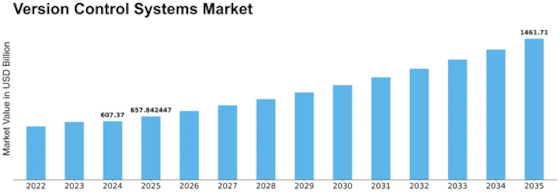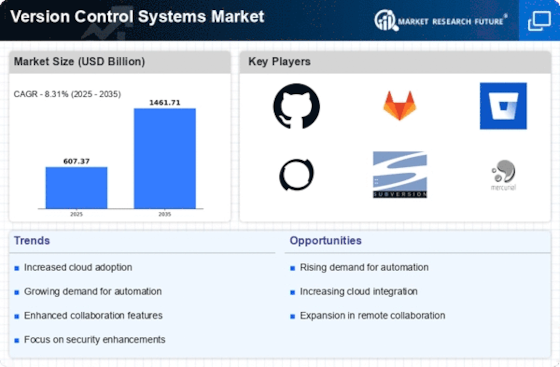-
Executive Summary
-
Scope of the Report
-
Market Definition
-
Scope of the Study
- Research Objectives
- Assumptions & Limitations
-
Markets Structure
-
Market Research Methodology
-
Research Process
-
Secondary Research
-
Primary Research
-
Forecast Model
-
Market Landscape
-
Porter’s Five Forces Analysis
- Threat of New Entrants
- Bargaining power of buyers
- Threat of substitutes
- Segment rivalry
- Bargaining power of suppliers
-
Value Chain/Supply Chain of Version Control Systems Market
-
Industry Overview of Version Control Systems Market
-
Introduction
-
Growth Drivers
-
Impact analysis
-
Market Challenges
-
Market Trends
-
Introduction
-
Growth Trends
-
Impact analysis
-
Version Control Systems Market by Type
-
Introduction
-
Centralized Version Control System (CVCS)
- Market Estimates & Forecast, 2020–2027
- Market Estimates & Forecast by Region, 2020–2027
-
Distributed Version Control System (DVCS)
- Market Estimates & Forecast, 2020–2027
- Market Estimates & Forecast by Region, 2020–2027
-
Version Control Systems Market by Deployment Type
-
Introduction
-
Cloud
- Market Estimates & Forecast, 2020–2027
- Market Estimates & Forecast by Region, 2020–2027
-
On-Premise
- Market Estimates & Forecast, 2020–2027
- Market Estimates & Forecast by Region, 2020–2027
-
Version Control Systems Market by Organization Size
-
Introduction
-
Small and Medium-Sized Enterprises
- Market Estimates & Forecast, 2020–2027
- Market Estimates & Forecast by Region, 2020–2027
-
Large Enterprises
- Market Estimates & Forecast, 2020–2027
- Market Estimates & Forecast by Region, 2020–2027
-
Version Control Systems Market by Vertical
-
Introduction
-
BFSI
- Market Estimates & Forecast, 2020–2027
- Market Estimates & Forecast by Region, 2020–2027
-
IT and Telecom
- Market Estimates & Forecast, 2020–2027
- Market Estimates & Forecast by Region, 2020–2027
-
Healthcare
- Market Estimates & Forecast, 2020–2027
- Market Estimates & Forecast by Region, 2020–2027
-
Education
- Market Estimates & Forecast, 2020–2027
- Market Estimates & Forecast by Region, 2020–2027
-
Retail
- Market Estimates & Forecast, 2020–2027
- Market Estimates & Forecast by Region, 2020–2027
-
Others
- Market Estimates & Forecast, 2020–2027
- Market Estimates & Forecast by Region, 2020–2027
-
Version Control Systems Market by Region
-
Introduction
-
North America
- Market Estimates & Forecast, 2020–2027
- Market Estimates & Forecast by Type, 2020–2027
- Market Estimates & Forecast by Deployment Type, 2020–2027
- Market Estimates & Forecast by Organization Size, 2020–2027
- Market Estimates & Forecast by Vertical, 2020–2027
- US
- Canada
- Mexico
-
Europe
- Market Estimates & Forecast, 2020–2027
- Market Estimates & Forecast by Type, 2020–2027
- Market Estimates & Forecast by Deployment Type, 2020–2027
- Market Estimates & Forecast by Organization Size, 2020–2027
- Market Estimates & Forecast by Vertical, 2020–2027
- Germany
- France
- Italy
- Spain
- UK
-
Asia-Pacific
- Market Estimates & Forecast, 2020–2027
- Market Estimates & Forecast by Type, 2020–2027
- Market Estimates & Forecast by Deployment Type, 2020–2027
- Market Estimates & Forecast by Organization Size, 2020–2027
- Market Estimates & Forecast by Vertical, 2020–2027
- China
- India
- Japan
- Rest of Asia-Pacific
-
Rest of the World
- Market Estimates & Forecast, 2020–2027
- Market Estimates & Forecast by Type, 2020–2027
- Market Estimates & Forecast by Deployment Type, 2020–2027
- Market Estimates & Forecast by Organization Size, 2020–2027
- Market Estimates & Forecast by Vertical, 2020–2027
- Middle East & Africa
- Latin America
-
Company Landscape
-
Company Profiles
-
CA Technologies
- Company Overview
- Product/Business Segment Overview
- Financial Updates
- Key Developments
-
IBM
- Company Overview
- Product/Business Segment Overview
- Financial Updates
- Key Developments
-
Microsoft
- Company Overview
- Product/Business Segment Overview
- Financial Updates
- Key Developments
-
Amazon.com
- Company Overview
- Product/Business Segment Overview
- Financial Updates
- Key Developments
-
Atlassian
- Company Overview
- Product/Business Segment Overview
- Financial Updates
- Key Developments
-
Codice Software
- Company Overview
- Product/Business Segment Overview
- Financial Updates
- Key Developments
-
Canonical Ltd.
- Company Overview
- Product/Business Segment Overview
- Financial Updates
- Key Developments
-
CollabNet
- Company Overview
- Product/Business Segment Overview
- Financial Updates
- Key Developments
-
LogicalDOC
- Company Overview
- Product/Business Segment Overview
- Financial Updates
- Key Developments
-
SourceGear LLC
- Company Overview
- Product/Business Segment Overview
- Financial Updates
- Key Developments
-
Conclusion
-
List of Tables
-
Global Version Control Systems Market, by Region, 2020–2027
-
North America: Version Control Systems Market, by Country, 2020–2027
-
Europe: Version Control Systems Market, by Country, 2020–2027
-
Asia-Pacific: Version Control Systems Market, by Country, 2020–2027
-
Rest of the World: Version Control Systems Market, by Country, 2020–2027
-
Global Version Control Systems Type Market, by Type, 2020–2027
-
North America: Version Control Systems Type Market, by Type, 2020–2027
-
Europe: Version Control Systems Type Market, by Type, 2020–2027
-
Asia-Pacific: Version Control Systems Type Market, by Type, 2020–2027
-
Table10 Rest of the World: Version Control Systems Type Market, by Type, 2020–2027
-
Table11 Global Version Control Systems Application Market, by Deployment Type, 2020–2027
-
Table12 North America: Version Control Systems Application Market, by Deployment Type, 2020–2027
-
Table13 Europe: Version Control Systems Application Market, by Deployment Type, 2020–2027
-
Table14 Asia-Pacific: Version Control Systems Application Market, by Deployment Type, 2020–2027
-
Table15 Rest of the World: Version Control Systems Application Market, by Deployment Type, 2020–2027
-
Table16 Global Version Control Systems Application Market, by Organization Size, 2020–2027
-
Table17 North America: Version Control Systems Application Market, by Organization Size, 2020–2027
-
Table18 Europe: Version Control Systems Application Market, by Organization Size, 2020–2027
-
Table19 Asia-Pacific: Version Control Systems Application Market, by Organization Size, 2020–2027
-
Table20 Rest of the World: Version Control Systems Application Market, by Organization Size, 2020–2027
-
Table21 Global Version Control Systems Application Market, by Vertical, 2020–2027
-
Table22 North America: Version Control Systems Application Market, by Vertical, 2020–2027
-
Table23 Europe: Version Control Systems Application Market, by Vertical, 2020–2027
-
Table24 Asia-Pacific: Version Control Systems Application Market, by Vertical, 2020–2027
-
Table25 Rest of the World: Version Control Systems Application Market, by Vertical, 2020–2027
-
Table26 Global Services Market, by Region, 2020–2027
-
Table27 North America: Version Control Systems Market, by Country
-
Table28 North America: Version Control Systems Market, By Application
-
Table29 North America: Version Control Systems Market, By End-User
-
Table30 North America: Version Control Systems Market, By Organization Size
-
Table31 North America: Version Control Systems Market, By Vertical
-
LIST OF FIGURES
-
Global Version Control Systems Market Segmentation
-
Forecast Methodology
-
Porter’s Five Forces Analysis of Global Version Control Systems Market
-
Value Chain of Global Version Control Systems Market
-
Share of Version Control Systems Market in 2020, by Country (in %)
-
Global Version Control Systems Market, 2020–2027,
-
Global Version Control Systems Market size by Type, 2020–2027
-
Share of Global Version Control Systems Market by Type, (in %)
-
Global Version Control Systems Market size by Deployment Type, 2020–2027
-
Share of Global Version Control Systems Market by Deployment Type, (in %)
-
Global Version Control Systems Market size by Organization Size, 2020–2027
-
Share of Global Version Control Systems Market by Organization Size, (in %)
-
Global Version Control Systems Market size by Vertical, 2020–2027
-
Share of Global Version Control Systems Market by Vertical, (in %)



















Leave a Comment